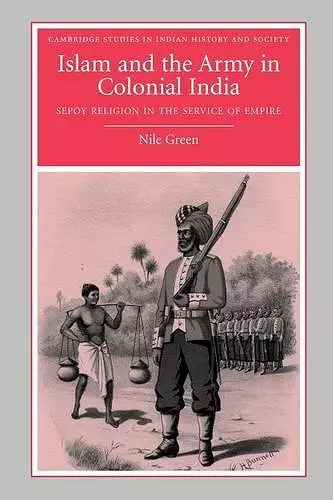Islam and the Army in Colonial India
Sepoy Religion in the Service of Empire
Format:Paperback
Publisher:Cambridge University Press
Published:19th Jul '12
Currently unavailable, and unfortunately no date known when it will be back
This paperback is available in another edition too:
- Hardback£53.00(9780521898454)

A study of the cultural world of the Muslim soldiers of colonial India in the mid-nineteenth and early twentieth centuries.
This book studies the cultural world of the Muslim soldiers of colonial India. Set in Hyderabad in the mid-nineteenth and early twentieth centuries, the book focuses on the soldiers' relationships with the faqir holy men who protected them and the British officers they served.Set in Hyderabad in the mid-nineteenth and early twentieth centuries, this book, a study of the cultural world of the Muslim soldiers of colonial India, focuses on the soldiers' relationships with the faqir holy men who protected them and the British officers they served. Drawing on Urdu as well as European sources, the book uses the biographies of Muslim holy men and their military followers to recreate the extraordinary encounter between a barracks culture of miracle stories, carnivals, drug-use and madness with a colonial culture of mutiny memoirs, Evangelicalism, magistrates and the asylum. It explores the ways in which the colonial army helped promote this sepoy religion while at the same time attempting to control and suppress certain aspects of it. The book brings to light the existence of a distinct 'barracks Islam' and shows its importance to the cultural no less than the military history of colonial India.
'This fascinating study of religious practice and religious change amongst the Muslim sepoys of the British Indian army confirms Nile Green's position as one of the most gifted young scholars of South Asian History.' Francis Robinson, Royal Holloway, University of London
'One of the supreme ironies of 'British' rule in India was that so much of the military power of an ostensibly 'Christian' state should have rested upon the shoulders of a 'Muslim' soldiery. Nile Green brilliantly explores this paradox, probing the subjectivity of many who served the Raj and insightfully recreating their cultural and religious traditions. His book represents an outstanding and highly original contribution to South Asian studies.' David Washbrook, Senior Research Fellow, Trinity College, Cambridge
'In a strikingly innovative work, Nile Green opens up a new understanding of the world of the Indian sepoy and offers fresh insight into the nature of Islam and the effects of colonial rule … There is much to relish in this immensely rewarding book … this is a splendidly accessible book, full of insight into the complex and subtle changes taking place in subaltern society. It is a book that deserves to be widely read not just for its content but for the inspiration it provides to a new generation of historical writing about South Asia.' David Arnold, Bulletin of the School of Oriental and African Studies
'Perhaps the biggest compliment that can be given to any historian is that their work has compelled others to look at their own research in new ways … [This book] has offered an entirely new framework through which I have been able to glimpse something of the 'miraculous' within subaltern understandings and experiences of a range of colonial forms of discipline and confinement … In large measure, this book is not just about 'barracks Islam', religion, or about the making of history beyond post-Hegelian understandings of 'scientific reasoning'. Islam and the Army [in Colonial India] is a history that can reach far beyond the academy itself, drawing family and community into epistemologies of modern India itself.' Clare Anderson, Journal of the Royal Asiatic Society
'… this volume is indeed an indispensable addition to the military, cultural and religious history of 19th-century India narrated from an essentially non-modern perspective … an irresistible feast of social history … We must be thankful to Nile Green for rescuing some of [the faqirs] in this excellent book which must be read by all teachers and students of Indian military and cultural history.' Anirudh Deshpande, Biblio
'Such wondrous tales are made possible by Green's using vernacular sources which lie beyond the ambit of the colonial archives … sit back and enjoy the richly spiced tales his work contains. The flair in Green's richly layered work is undeniable.' Sabyasachi Dasgupta, The Book Review
'… there is little doubt that the work will emerge as a valuable contribution to the field … the book offers a very distinctive slant on the interface between Islam and colonialism.' Justin Jones, Journal of Islamic Studies
'… an insightful foray into military history as it enables us to comprehend the relationship between armies and their religion during the raj … the book is based on a wide variety of sources that makes it a well-researched work … avant-garde in the sense that it is the first of its kind to attempt reconstructing the socio-cultural and religious life of the Indian soldier who served colonial masters.' Shilpi Rajpal, Economic and Political Weekly
'Its research and its approach are both ground-breaking. Nile Green deserves to be congratulated for his contribution to a neglected field of modern Indian history.' The Telegraph
ISBN: 9781107404632
Dimensions: 229mm x 152mm x 14mm
Weight: 360g
238 pages